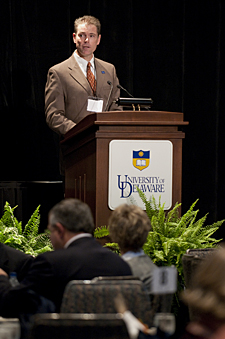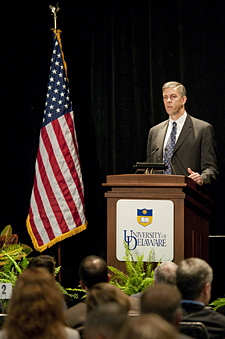
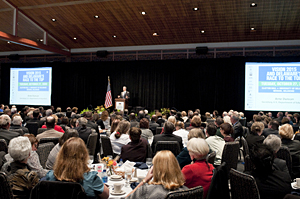
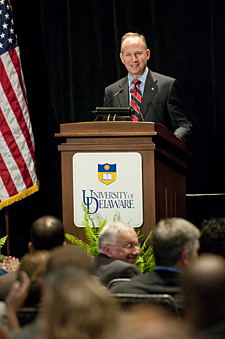
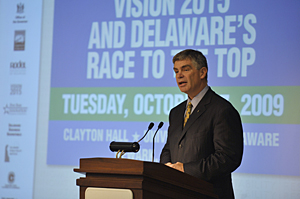
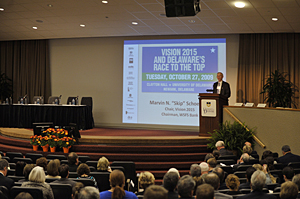
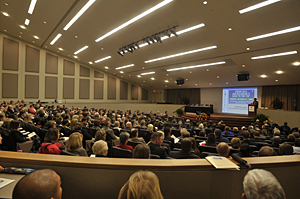
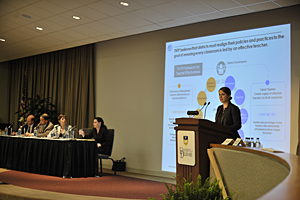
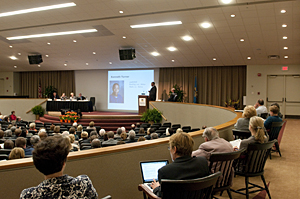
ADVERTISEMENT
- Rozovsky wins prestigious NSF Early Career Award
- UD students meet alumni, experience 'closing bell' at NYSE
- Newark Police seek assistance in identifying suspects in robbery
- Rivlin says bipartisan budget action, stronger budget rules key to reversing debt
- Stink bugs shouldn't pose problem until late summer
- Gao to honor Placido Domingo in Washington performance
- Adopt-A-Highway project keeps Lewes road clean
- WVUD's Radiothon fundraiser runs April 1-10
- W.D. Snodgrass Symposium to honor Pulitzer winner
- New guide helps cancer patients manage symptoms
- UD in the News, March 25, 2011
- For the Record, March 25, 2011
- Public opinion expert discusses world views of U.S. in Global Agenda series
- Congressional delegation, dean laud Center for Community Research and Service program
- Center for Political Communication sets symposium on politics, entertainment
- Students work to raise funds, awareness of domestic violence
- Equestrian team wins regional championship in Western riding
- Markell, Harker stress importance of agriculture to Delaware's economy
- Carol A. Ammon MBA Case Competition winners announced
- Prof presents blood-clotting studies at Gordon Research Conference
- Sexual Assault Awareness Month events, programs announced
- Stay connected with Sea Grant, CEOE e-newsletter
- A message to UD regarding the tragedy in Japan
- More News >>
- March 31-May 14: REP stages Neil Simon's 'The Good Doctor'
- April 2: Newark plans annual 'wine and dine'
- April 5: Expert perspective on U.S. health care
- April 5: Comedian Ace Guillen to visit Scrounge
- April 6, May 4: School of Nursing sponsors research lecture series
- April 6-May 4: Confucius Institute presents Chinese Film Series on Wednesdays
- April 6: IPCC's Pachauri to discuss sustainable development in DENIN Dialogue Series
- April 7: 'WVUDstock' radiothon concert announced
- April 8: English Language Institute presents 'Arts in Translation'
- April 9: Green and Healthy Living Expo planned at The Bob
- April 9: Center for Political Communication to host Onion editor
- April 10: Alumni Easter Egg-stravaganza planned
- April 11: CDS session to focus on visual assistive technologies
- April 12: T.J. Stiles to speak at UDLA annual dinner
- April 15, 16: Annual UD push lawnmower tune-up scheduled
- April 15, 16: Master Players series presents iMusic 4, China Magpie
- April 15, 16: Delaware Symphony, UD chorus to perform Mahler work
- April 18: Former NFL Coach Bill Cowher featured in UD Speaks
- April 21-24: Sesame Street Live brings Elmo and friends to The Bob
- April 30: Save the date for Ag Day 2011 at UD
- April 30: Symposium to consider 'Frontiers at the Chemistry-Biology Interface'
- April 30-May 1: Relay for Life set at Delaware Field House
- May 4: Delaware Membrane Protein Symposium announced
- May 5: Northwestern University's Leon Keer to deliver Kerr lecture
- May 7: Women's volleyball team to host second annual Spring Fling
- Through May 3: SPPA announces speakers for 10th annual lecture series
- Through May 4: Global Agenda sees U.S. through others' eyes; World Bank president to speak
- Through May 4: 'Research on Race, Ethnicity, Culture' topic of series
- Through May 9: Black American Studies announces lecture series
- Through May 11: 'Challenges in Jewish Culture' lecture series announced
- Through May 11: Area Studies research featured in speaker series
- Through June 5: 'Andy Warhol: Behind the Camera' on view in Old College Gallery
- Through July 15: 'Bodyscapes' on view at Mechanical Hall Gallery
- More What's Happening >>
- UD calendar >>
- Middle States evaluation team on campus April 5
- Phipps named HR Liaison of the Quarter
- Senior wins iPad for participating in assessment study
- April 19: Procurement Services schedules information sessions
- UD Bookstore announces spring break hours
- HealthyU Wellness Program encourages employees to 'Step into Spring'
- April 8-29: Faculty roundtable series considers student engagement
- GRE is changing; learn more at April 15 info session
- April 30: UD Evening with Blue Rocks set for employees
- Morris Library to be open 24/7 during final exams
- More Campus FYI >>
Editor's note: For a Podcast of Arne Duncan's remarks, visit the University's Podcast page. Videos of the entirec conference are available at a special Web site.
2:11 p.m., Oct. 28, 2009----U.S. Secretary of Education Arne Duncan said during a presentation Tuesday, Oct. 27, at the University of Delaware that he believes the current economic crisis is as good a time as any for leaders at the state and national levels to make long-term positive changes to America's educational system.
“This is an amazing time to be working in education in this country,” Duncan said. “We are going through a crisis, we have the worst economy since the Depression, we are fighting a couple of wars and we also are fighting an educational crisis.”
Duncan made his remarks during the conference “Vision 2015 and Delaware's Race to the Top,” which was held in Clayton Hall.
Delaware Gov. Jack Markell also addressed the audience of more than 500 during the fifth in a series of conferences dedicated to creating knowledge-based partnerships.
Begun three years ago, Vision 2015 is led by a 28-person steering committee of education, business, government and community leaders. Vision 2015 goals include setting high standards for all students, investing deeply in early childhood education, developing and supporting great teachers, empowering principals, engaging families, businesses and the community, requiring accountability, rethinking funding and stressing technology.
Higher standards, financial commitment
Higher standards and a greater financial commitment to education are essential if America wants to fully meet the educational needs of its children, Duncan said.
“Base test scores are flat, and we are not making the progress that we want,” Duncan said. “Among 15-year-olds in terms of math abilities, the United States is ranked 31st internationally. That is the reality.”
Topping the list of concerns, Duncan noted, is a 30 percent dropout rate that equates to 1.2 millions students who leave school before graduating every year.
“We know that this dropout rate equates to failure,” Duncan said. “We need to do dramatically better. I don't want to come here two years from now and say we are down to 28 percent.”
Duncan said America must significantly increase its high school graduation rates and make sure that students have the proper educational background to achieve success in college.
“We used to lead the world two and a half decades ago,” Duncan said. “Our rates became stagnated, and many other countries have passed us by. Collectively, we have hit a bottom.”
To address these issues, Duncan said President Barack Obama has laid out a comprehensive educational agenda that targets accelerated reforms in areas from preschool to higher education.
Included in this initiative, Duncan said, is the U.S. Department of Education's $4.35 billion Race to the Top, which will make available competitive grants to support states' education reform efforts and innovation in classrooms.
Race to the Top will award grants to states that are leaders in education reform and have innovative plans to increase student achievement, improve graduation rates and narrow the achievement gap. The U.S. Department of Education will award grants in two rounds, one in spring 2010 and another in late 2010.
“We have to get dramatically better in all of these areas,” Duncan. “We have to do it now to get where we need to go.”
While such funding is critically important, Duncan said the money must be used not only to fix the current ills that plague the nation's educational systems but also to create positive and lasting change.
The best ideas on how to do this, Duncan said, are not going to come from Washington, D.C., but from the state and local levels.
“The best ideas come from great principals, great teachers, great superintendents and great districts making a difference in students' lives,” Duncan said. “We have this amazing opportunity to invest in what works and erase the achievement gap and raise the bar to a different level for our children.
Delaware, as one of 48 states involved in this effort, has a chance to become a national and international leader in education reform, Duncan said.
Such efforts, Duncan noted, include rethinking the way students are assessed and how this information is use to make positive changes.
“I think Delaware is working really hard to break through on this, particularly on the K-8 level,” Duncan said. “There is a chance to give our best teachers better tools to help them reach every single child in real time and not just in the summer. Delaware has the chance to lead the country where it needs to go, or it can just sit on the sidelines.”
While there are encouraging signs across the nation, much has to be done to better serve the needs of America's students, Duncan said.
“This is a national challenge,” Duncan said. “Please don't do this for the money, but do it for the children. If we keep coming together, it means we have a chance.”
Markell on education in Delaware
In welcoming Duncan and conference attendees, Markell lauded state educators, legislators and business leaders for their efforts on behalf of Vision 2015.
“I want to thank you for the passion and commitment you have brought to the issue of education reform in Delaware,” Markell said. “Your advocacy has helped keep this critical issue on the forefront of public debate for years and I commend you for it.”
While public education in America is seen by many as letting down the nation's schoolchildren, Markell noted that a collaborative statewide effort that includes school-based personnel, business representatives, teachers and parents, the state Department of Education, district administrators and local school boards can work to achieve the goals set forth by Vision 2015.
“By placing our children first and foremost, Delaware schools will produce students prepared to succeed,” Markell said. “Those students will learn in schools staffed by highly qualified teachers who are passionate about their profession and are managed by administrators who offer inspiration and collaboration, access to innovation and useful assistance.”
Such an effort will require allowing school districts the flexibility to allocate resources to improve performance while also being held strictly accountable for their work, Markell said.
Markell noted that a statewide educational agenda must ensure that children are ready and able to succeed in a world in which they will be competing internationally for rewarding jobs.
“That is why it is critical to participate in the Common Core State Standards Initiative, joining governors and state commissioners from across the country committed to developing a common core of state standards in English-language arts and mathematics for grades K-12,” Markell said. “I am pleased to co-lead his initiative with Gov. [Sonny] Perdue of Georgia.”
The adoption of such standards also requires an accurate and reliable system to measure student and teacher performance, Markell said.
“We must measure learning in a way that provides not only a benchmark of student knowledge, but that also helps guide classroom instruction and can be used for accountability purposes,” Markell said. “That is why we scrapped the Delaware State Testing Program and why we will implement the Delaware Comprehensive Assessment System, providing a series of assessments that can be given up to three times over the course of the year.”
This approach, Markell noted, would permit teachers to use testing results to assess a student's progress throughout the school year and to adjust their teaching to the child's needs if necessary.
“For students, this system will help to address the test anxiety that many of them talk about,” Markell said. “Because the test can be given multiple times, it is less likely that a student's performance will be marred because of a bad day or anxiety over the fact that one day's performance is going to be what matters.”
Markell also said more decisions about how to educate children should be made by those closest to them, their teachers and other school-based personnel.
“We hire professionals to teach our kids,” Markell said. “Let's treat them like professionals and encourage them to use their training and their creativity rather than impose upon them mandates that simply don't make any sense.”
Pursuing Race to the Top funding is important, Markell said, because it will allow the state to support teacher efforts by providing increased availability of supplemental services and after-school programming, more availability of family crisis therapists and linkage with community-based programs.
“We will also work with districts, schools and teachers to implement a parent education and awareness campaign and use resources to encourage parental participation,” Markell said. “Parental involvement can be the most critical factor for student success.
Markell also reemphasized Duncan's call for cooperation, not division, among the major stakeholders in guaranteeing a successful educational future for children in the First State.
“While some like to paint huge divisions between many of the players, I have learned something over these last many months,” Markell said. “When it comes to improving Delaware's schools, we all have much more in common than we have differences. Let's find those commonalities. Let's debate those differences. And let's work together on an agenda that will allow us to say that we provided our children with the opportunities they so richly deserve.”
The luncheon program also included remarks by Paul Herdman, president and CEO of the Rodel Foundation of Delaware, and Courtney Fox, the 2008 Teacher of the Year from Lake Forest Elementary School.
Conference attendees also were greeted with a special pre-luncheon musical salute by members of the A.I. du Pont High School Marching Band.
Welcome, morning panel discussions
In his opening remarks, UD President Patrick Harker noted the University's role as a major provider for teacher education with a compelling interest in improving education, not only because UD students are drawn from the state's pool of high school graduates but also because of the sheer reach of its teacher education and school leadership programs.
In the area of teacher reform, Harker noted that UD has built strong clinical experiences into many of its teacher education programs, with the establishment of one such program that is thoroughly integrated into the Milford School District in Sussex County.
“More recently, we've led the nation in developing a strong evidentiary basis for the design of teacher education programs,” Harker said. “With more than a decade of National Science Foundation funding, we're studying how pre-service teachers acquire the knowledge they need to teach math and science, and are now tracking graduates to see how they apply in their own classrooms the skills they learned in ours.”
Harker also noted the role of the University in creating a Vision 2015 network that now includes 25 schools serving some 20,000 students across the First State.
“The University of Delaware is proud to be a partner in the effort,” Harker said. “Our faculty and administrators were key contributors to the plan and its implementation strategies, and UD's Delaware Academy for School Leadership provides executive training to the leaders of schools that are part of the Vision 2015 network.”
The conference also included a progress report by Marvin N. “Skip” Schoenhals, who chairs Vision 2015. Lillian M. Lowery, secretary of the Delaware Department of Education, spoke on the development of public education in the United States.
Panel discussions included "Ensuring Highly Effective Teachers for All Delaware Students.” Moderated by John H. Taylor, executive director of the Delaware Public Policy Institute, the panel included presentations by Sandi Jacobs, vice president for policy with the National Council on Teacher Quality, and Crystal Harmon, partner in Policy and Research at The New Teacher Project.
Panel respondents included Diane Donohue, president of the Delaware State Education Association; Jack Perry, executive director, Prestige Academy; and Jeffrey Raffel, Charles P. Messick Professor of Public Administration at UD.
The panel discussed what Delaware must do to recruit, support and keep more great teachers, and to distribute them equitably to all classrooms.
A panel on "Turning Around Our Lowest-Performing Schools" was moderated by Daniel E. Cruce, associate secretary and chief of staff, administration and innovation with the Delaware Department of Education.
Presenters included Andre Cowling, principal of the Harvard School of Excellence in Chicago, and William H. Guenther, president and founder of Mass lnsight Education and Research Institute.
Panel respondents included Mervin B. Daugherty, superintendent of the Red Clay Consolidated School District; Christy Greaves, principal of North Laurel Elementary School; and Howard Weinberg, executive director of the Delaware State Education Association.
The discussion noted that 40,000 Delaware students are in schools that failed to meet their adequate yearly progress targets in 2009, and that 26,000 of those students are in schools that have not met their targets for at least five consecutive years. In the session, national and local experts discussed how to build an intensive support system to reverse the crisis of chronically low-performing schools to ensure that every student in Delaware gets the quality education they deserve.
The fifth in the University's series of programs focusing on creating knowledge-based partnerships, the conference was sponsored by the University of Delaware, the Office of the Governor, the Delaware Department of Education, the Rodel Foundation of Delaware, Vision 2015, Education Voters of Delaware, the Delaware Business Roundtable, First State Innovation, the Delaware State Chamber of Commerce, the Delaware Public Policy Institute, Delaware State University, Delaware Technical and Community College and The News Journal.
Article by Jerry Rhodes
Photos by Kathy F. Atkinson and Evan Krape



